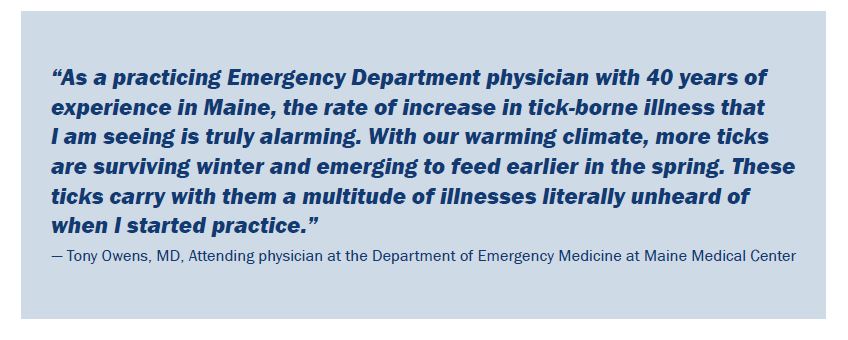Climate Change Harms the Health of Maine People
Climate Change Brings Unhealthy Air
Ground-level ozone “smog” triggers asthma attacks, harms those with lung diseases, and makes it difficult for healthy people to breathe, too. Heat is a major factor in the formation of ozone smog, so the more our climate warms, the more smog Maine is likely to experience. Breathing ozone can irritate eyes and throat, and damage lungs and airways. This leads to more emergency room visits and hospitalizations, less capacity for outdoor work and exercise, and an increase in the rate of premature deaths among vulnerable people like children, the elderly, and people who struggle with asthma. About one in nine Mainers suffers from asthma, which is among the highest asthma rates in the country.
Warmer summers extend Maine’s allergy season and increase the concentration of pollen in the air we breathe. This increases complications from hay fever and other allergies, and can increase the frequency of asthma attacks.

Climate Change Brings More Damaging Storms, Rainfall, and Flooding
Flooded sewer and stormwater systems pollute Maine rivers and coastal waters, causing more water-borne diseases such giardia. Every year, when storms overwhelm water treatment systems, hundreds of millions of gallons of stormwater mixed with raw sewage are discharged into local waterways. Such sewage flooding will become more frequent as climate change continues.
Rising seas from climate change batter Maine’s coast, buildings, and roads. Higher seas make flooding events worse, and make it more difficult for first responders to get to emergency scenes.
Climate Change Brings More Disease-carrying Insects
Maine’s shorter and milder winters, coupled with longer warm seasons, generate more mosquitos and ticks, and the illnesses they carry. Maine is now the worst state in the country for tick-borne Lyme disease, with 1,787 reported cases in 2017, up from 175 cases in 2003. Lyme disease and other vector-borne illnesses, including life-threatening anaplasmosis and babesiosis are also on the rise.

Climate Change Brings More Extreme Heat Waves
Because of climate change, extreme heat waves will become more common and more intense in Maine. Heat waves disproportionately harm children, the elderly, and people in lower income households.
Emergency room visits for heat-related illnesses are expected to rise, along with hospitalizations for heart disease and diabetes, which are also made worse by hot weather.









